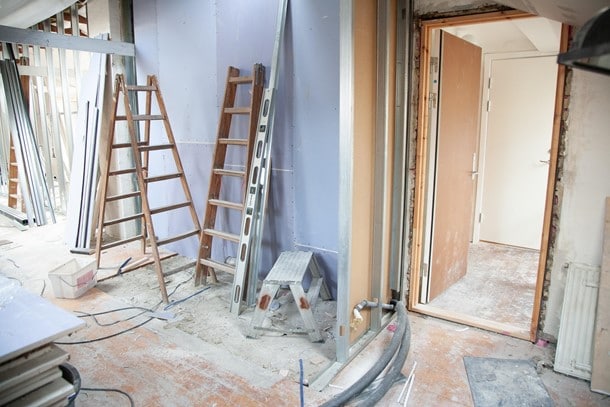DIY or DI-Don’t? Common Mistakes Homeowners Can Avoid

Home improvement projects are a great way to add value to your home. Doing them yourself can also save you money. However, even if you have superior DIY skills, some projects are better left to professionals.
Determining Your Ability to DIY Home Projects
How can you determine which projects to tackle and which would be more of a headache? Remember that DIY projects are an investment of time as well as money. If you only have a few hours of free time per week, home improvement projects will take more time.
You must also take into account that inclement weather can delay outdoor projects and indoor ones that require ventilationVentilation is the process of exchanging or circulating air ... More, while a contractor has tools such as high-powered fans to address those issues. You also must gauge your ability to handle the labor and risks involved. Projects that impact health, safety, structural integrity, or that need to meet specific standards can be difficult to DIY.
The High Cost of Failed Home Renovations
For homeowners, a major DIY home project blunder can be expensive and time-consuming. For example, an online contracting service found that improperly installed floors cost homeowners over $800 to correct, on top of their initial investment. A flubbed electrical project can also put your safety at risk.
Other projects sound like a good idea only to become a disaster thanks to poor planning. Homeowners have made hair-raising home improvement failures, like cutting a beam that supports the house for decorative purposes or running a waste pipe over the basement stairs. One homeowner even placed the home’s electrical box under a water spigot!
Even if you don’t fall prey to these foolish blunders, some choices still can leadLead is a heavy metal that can be toxic to humans, especiall... More to costly home DIY mistakes. For example, you may save money by using cheaper materials, but the work might not last.
For any home renovation job, ask yourself these questions:
- Do I need any work permits and do I know how to get them?
- Am I measuring properly?
- What sort of prep work is required before starting?
- Do I have the right tools on hand?
- Do I need to rent power tools to get the job done properly?
Home Improvement Projects Best Left to the Professionals
Some projects are better off in the hands of a qualified contractor. Doing these repairs yourself can break the bank and cause serious problems if not done properly:
Major Reconstruction Projects
Any structural home projects such as foundation repairRepair is the act of fixing or restoring damaged property, m... More, large-scale roofing projects, and even aluminum siding require a licensed and bonded contractor. Professionals can spot things you may miss, such as moldMold is a type of fungus that grows in damp or humid conditi... More, rot, or cracks that are worse than they seem. While you can repairRepair is the act of fixing or restoring damaged property, m... More minor issues like loose shingles, hiring a contractor protects you from injury from unsafe tasks such as walking on your roof.
Fire Damage
Home insurance may not cover all the damage caused by fire so you may be tempted to handle some of the work yourself. However, residual ash can cause latent damage to your home’s structureStructure refers to the framework or components of a buildin... More that are you unaware of. Hire an expert to handle the reconstruction and ensure that all work is done properly and completely.
Water Damage
Likewise, water damage can be worse than it initially appears. While there are affordable ways for you to restore some types of damage, these repairs must be done as soon as they are discovered. If a leak or other water issues have been going on for some time, you should hire a professional to safeguard your home’s structural integrity.
Mold RemediationMold remediation is the process of identifying, removing, an... More
MoldMold is a type of fungus that grows in damp or humid conditi... More is a common problem for homeowners who’ve experienced water. It can eat through wood or drywall, creating damage. Worse yet, moldMold is a type of fungus that grows in damp or humid conditi... More can cause health problems ranging from allergies to more serious issues, depending on the type of moldMold is a type of fungus that grows in damp or humid conditi... More.
Because of this, DIY mold removal is not safe. Hiring a professional ensures that all the moldMold is a type of fungus that grows in damp or humid conditi... More is safely removed without risking your own health. Contractors with expertise in mold remediation may also find hidden sources of moldMold is a type of fungus that grows in damp or humid conditi... More since they know what to look for.
Major Electrical Projects
You can do many minor electrical projects yourself, however, you must be sure that your repairs are up to code. For example, if you have a hot tub in your bathroom, you must properly and carefully ground all hot tub electric installations. It may even require an inspectionInspection is the careful examination and assessment of a pr... More to ensure it has been set up safely.
Utility Damage
Finally, if your home repairs require any kind of access to public utilities, such as a water or sewer line, it’s best to call in professionals to deal with the problem. You are responsible for any problems that occur on your property, but you do not want to risk making these issues far worse.
Pros and Cons of Hiring a Contractor
Of course, hiring a contractor for remodeling or repairs has pros and cons. Contractors provide a better quality of work, saving you time and effort. Their expertise and access to high-quality materials and equipment, as well as their knowledge of permits and codes, ensure that your project is done right the first time.
However, hiring a contractor is going to be a bigger investment since you pay for labor as well as materials. You are still involved in the project, including packing and/or moving items and cleaning up, but you’re not in charge. Letting professionals handle things also means that you won’t get a firsthand look at how your home functions.
Finally, you must set a budget before finally deciding whether to hire a professional or DIY the work. Research potential project costs, time to completion, and whether permits are required. You might also want to purchase additional insurance to cover potential issues that arise.
Home Improvement You Can Tackle
However, there are certain projects that most homeowners can tackle:
Basic Home Maintenance
As a homeowner, don’t hire a contractor for every little project. Teach yourself basic home maintenance tasks, like painting, weatherstripping windows, or patching up minor holes in your drywall to save money.
Simple Landscaping Projects
Basic gardening, yard organization, and adding charming accents is an affordable ways to create curb appeal even if your home has a small yard.
DIY Projects for Homeowners
Other simple yet surprising ways to add value to your home without hiring a contractor include installing a new front or garage door, refreshing bathroom fixtures, or adding a fence.
Should you DIY or DI-Don’t your home improvement project? To answer that question, costs, time, safety, and expertise must be considered in light of what you are trying to achieve. Take a little time to do appropriate due diligence before committing one way or the other.












